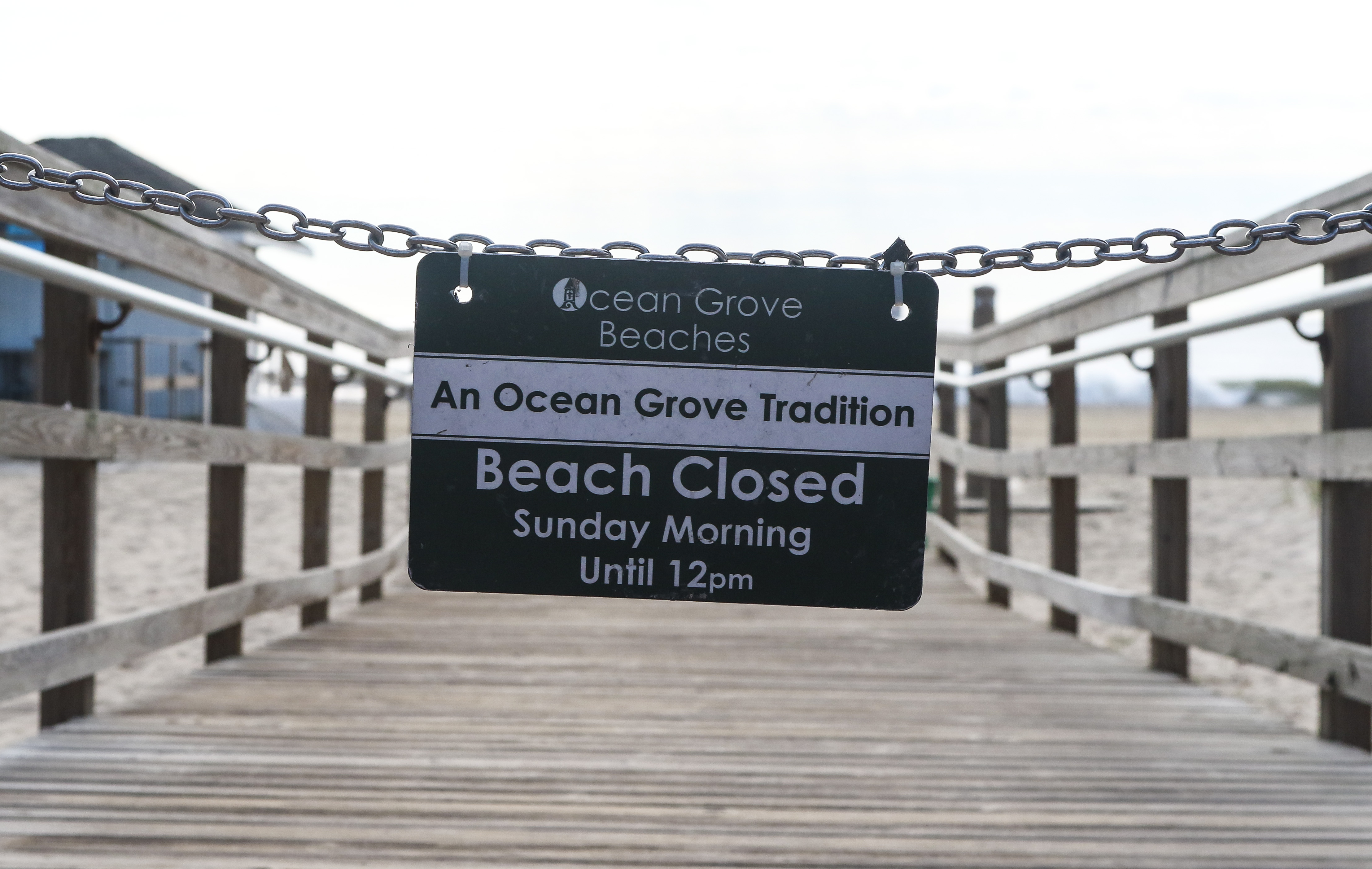
Open Beach Access in Ocean Grove, NJ
Open Sunday Access to Ocean Grove Beach
The Jersey Shore Chapter of the Surfrider Foundation is working to end the practice of closing the Ocean Grove, New Jersey beach to the public on summer Sunday mornings until noon. The Chapter is working with a local community group, Neptune United, who were the first to call for the closures to end.
The Chapter issued a press release on September 26, 2023, alerting the New Jersey public to a spate of beach closures and access issues in northern NJ that cropped up in late summer, including at Bradshaw’s and Jenkinson’s beaches in Point Pleasant, Seaside Heights, and the long standing beach closure at Ocean Grove.
On October 18, 2023, the Chapter released a second press release after a flurry of legal action related to Ocean Grove in the fall. On October 12, the New Jersey Department of Environmental Protection (NJDEP) sent an Administrative Order to the Ocean Grove Camp Meeting Association (OGCMA), informing OGCMA that their continued closure of the Ocean Grove beach on summer Sundays is in violation of State law. Previously, NJDEP sent similar notices to the OGCMA on August 10 and September 14, 2023.
The Order states: “The Permittee [OGCMA] cannot limit vertical or horizontal public access to any dry sand beach area…nor interfere with the public's right to free use of the dry sand for intermittent recreational purposes connected with the ocean and wet sand." The OGCMA can be charged a civil penalty of up to $25,000 per day from when the Order was issued.
Ocean Grove is an unincorporated section of Neptune Township in Monmouth County that began as a Christian “camp meeting” in the late 1800s. Through a special charter with Monmouth County, it operates as a largely independent town and does not allow access to the beach before noon on Sundays. There is not a legal exception for beach closures for religious reasons in New Jersey.
Complicating the matter, on October 2, 2023, the OGCMA sued a local community group, Neptune United, which had been attempting to end the summer Sunday closures. The lawsuit accused Neptune United members of disruptive behavior and trespassing on private property, and asked the Monmouth County Superior Court to legitimize OGCMA’s Sunday beach closures.
In response to OGCMA’s lawsuit against Neptune United, on October 13, 2023 the New Jersey Attorney General informed the Monmouth County Superior Court that they will be intervening in the case.
Many different New Jersey groups and citizens rely on beach access for recreation, quality of life, and peace of mind. These groups include surfers, swimmers, bird watchers, fishing groups, and anyone who wants to take a break from modern living and stroll along the shore. And it is their legal right as New Jerseyans.
New Jersey has clear beach access rights language in State regulations, common law, and our State Constitution. These rights originate from the Public Trust Doctrine, in which the public rights to tidal waterways and their shores are held by the state in trust for the benefit of all people. The doctrine further provides that the public has the right to fully utilize these lands and waters for a variety of public activities, including recreating on the dry sand and accessing the ocean.
The Murphy Administration worked to codify the Public Trust Doctrine into State law in 2019, passing the NJ Public Trust Doctrine Act of 2018. That law codifies state obligations to ensure that the public has meaningful access to, and use of, the shoreline, tidal waters and other areas subject to the Public Trust Doctrine.
Furthermore, multiple legal cases over the years have upheld the publics’ right to use New Jersey beaches. Those cases held that in order for the public to enjoy Public Trust lands, they have the right to gain access through, and the use of, dry sand areas on privately owned beaches, and that a private beach owner can not limit vertical or horizontal access to wet and dry sand beach areas for intermittent recreational purposes.
Additionally, if a municipality accepts federal funding for beach replenishment projects, as most did after Hurricane Sandy (and continue to accept in the frequent beach fill projects up and down the NJ coast), additional rights are granted to the public. Those rights include: open and equal public use to all, sufficient parking, and public access points at least every quarter mile.
The onus for enforcement is on beachfront municipalities. Under the Public Trust Doctrine in New Jersey, municipalities are trustees of the beaches within their boundaries and must operate and maintain those beaches for the benefit of all members of the public.
Yes, municipalities do have the right to close beaches for short periods of time for specific dangerous water or beach conditions, but not long term and never for vague reasons. Using pending lawsuits and the specter of future liability is also not a valid excuse to deny public rights as local governments are sued frequently for various reasons – should we close down the sidewalks because somebody sued a municipality over a slip and fall case?
All New Jerseyans must stay vigilant and continue to fight to protect our beach access rights. Private landowners who want the beach to themselves, and local governments who find it easier to lock a beach than protect the public’s rights, will forever attempt to limit beach access for frivolous or illegal reasons.
Currently, the Jersey Shore Chapter is monitoring the situation and looking to take more steps to reopen Ocean Beach on summer Sundays.
